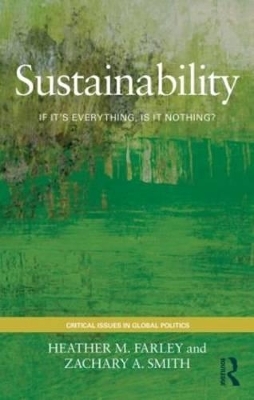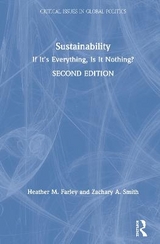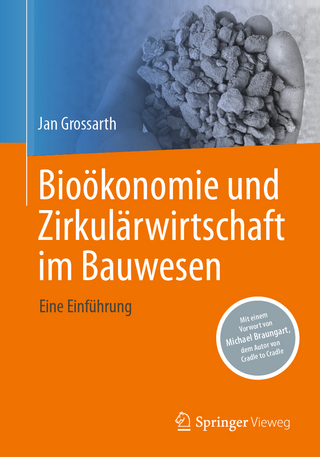
Sustainability
If It's Everything, Is It Nothing?
Seiten
2013
Routledge (Verlag)
978-0-415-78353-8 (ISBN)
Routledge (Verlag)
978-0-415-78353-8 (ISBN)
- Titel erscheint in neuer Auflage
- Artikel merken
Zu diesem Artikel existiert eine Nachauflage
Humans are not living within our ecological means. We are using the earth’s resources at a pace that cannot be maintained. We have already seen evidence of the fallout associated with ecological overconsumption and continued abuse of environmental systems will create increasing challenges both today and into the future. Our depletion of natural systems minimizes the possibilities available to future generations who are expected to somehow rely on innovation and ingenuity for their survival. Yet, despite the challenges we face, governments, individuals, non-profits, educational institutions, and corporations are all heralding the promise of sustainable development to save our environmental systems from collapse while allowing for uninterrupted economic growth.
Today, the concept of sustainability is a widespread goal that nearly everyone supports. At the same time, almost no one means the same thing when they use the term. Sustainability is so broad and overly used that it seems to mean everything to everyone. The result is that the concept has lost its meaning. In this book, the authors examine the misuses and abuses of "sustainability" and seek to refine and clarify the concept. The authors offer a new definition of sustainability – what they call neo-sustainability – to help guide policies and practices that respect the primacy of the environment, the natural limits of the environment, and the relationship between environmental, social, and economic systems.
Today, the concept of sustainability is a widespread goal that nearly everyone supports. At the same time, almost no one means the same thing when they use the term. Sustainability is so broad and overly used that it seems to mean everything to everyone. The result is that the concept has lost its meaning. In this book, the authors examine the misuses and abuses of "sustainability" and seek to refine and clarify the concept. The authors offer a new definition of sustainability – what they call neo-sustainability – to help guide policies and practices that respect the primacy of the environment, the natural limits of the environment, and the relationship between environmental, social, and economic systems.
Heather M. Farley is a former University Sustainability Coordinator and a researcher at Northern Arizona University, USA. Zachary A. Smith is a Regents’ Professor of Environmental and Natural Resources Policy and Administration in the Department of Politics and International Affairs at Northern Arizona University, USA.
Introduction 1. A Brief History: The Early Debates that Shaped Sustainability 2. A Brief History: International Sustainable Development Events, Agreements, and Commitments 3. Multidisciplinary Ways of Defining Sustainability 4. Government Responses to the Sustainability Challenge 5. Non-governmental Institutions and Sustainability 6.Neo-Sustainability
| Erscheint lt. Verlag | 8.8.2013 |
|---|---|
| Reihe/Serie | Critical Issues in Global Politics |
| Zusatzinfo | 7 Line drawings, black and white; 7 Illustrations, black and white |
| Verlagsort | London |
| Sprache | englisch |
| Maße | 138 x 216 mm |
| Gewicht | 340 g |
| Themenwelt | Naturwissenschaften ► Biologie ► Ökologie / Naturschutz |
| Naturwissenschaften ► Geowissenschaften ► Meteorologie / Klimatologie | |
| Sozialwissenschaften ► Politik / Verwaltung ► Europäische / Internationale Politik | |
| Sozialwissenschaften ► Politik / Verwaltung ► Politische Theorie | |
| ISBN-10 | 0-415-78353-4 / 0415783534 |
| ISBN-13 | 978-0-415-78353-8 / 9780415783538 |
| Zustand | Neuware |
| Haben Sie eine Frage zum Produkt? |
Mehr entdecken
aus dem Bereich
aus dem Bereich
Buch | Softcover (2024)
Springer Vieweg (Verlag)
CHF 69,95



